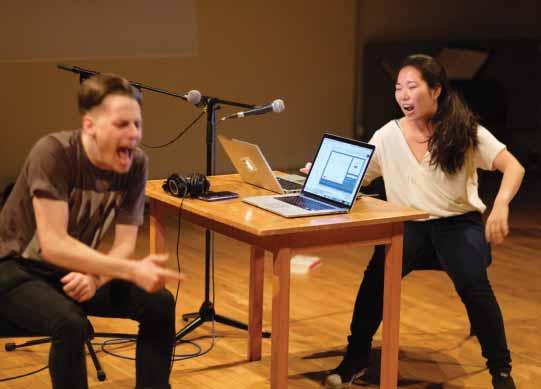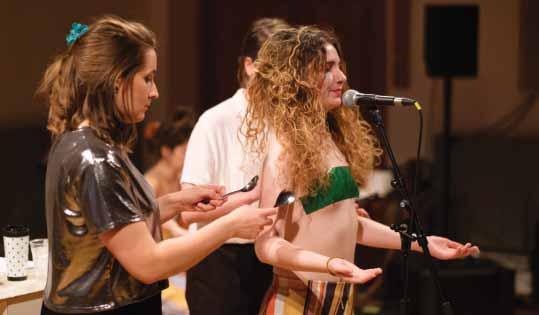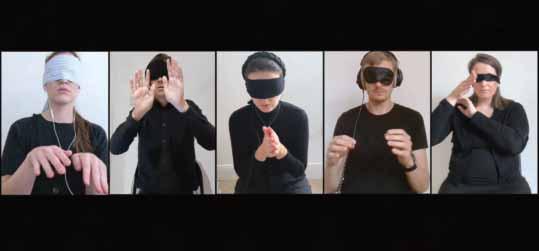
8 minute read
CAPPA performance arts course goes digital

Composer Larry Goves tells Vinota Karunasaagarar how multimedia resources allowed him to offer his students a rewarding online experience as we eased out of lockdown
Above: Vinota Karunasaagarar, ISM Creative Content & Publications Manager
Photo: Emile Holba
Read our previous feature for further examples of how musicians adapted to lockdown
Top: Larry Goves Left: Piece by Michael Brailey at the Composition, Alternative Performance and Performance Art course recital (photo taken at CAPPA 2018) While many educational establishments were forced to suspend their courses due to the COVID-19 lockdown, the Composition, Alternative Performance & Performance Art (CAPPA) course went ahead but transitioned to online. CAPPA was fi rst launched in 2018 at Snape Maltings, Suffolk, one of the world’s leading centres for music, as one of two Britten-Pears Arts composition courses. This course focused on collaborative and multidisciplinary experimental music practice, also considering visual and performance art.
‘CAPPA arose from a lecture series I ran at the Royal Northern College of Music (RNCM) called Music, Alternative Performance and Performance Art,’ explains its director, composer and artist Larry Goves. ‘It explored trends in certain areas of contemporary music practice, acknowledging practitioners who work in an increasingly intermedial and/or multidisciplinary way; it looked at the history and context of performance art, revisiting Fluxus, the international, interdisciplinary community of artists, composers, designers and poets who engaged in experimental art performances during the 1960s and 1970s, emphasising the artistic process over the fi nished product. The lecture series began with a thought experiment: if other approaches to performance art from the 20th century had been allowed equal prominence in secondary and tertiary education, what would a music conservatoire look like today?’
At Britten-Pears Arts, Chief Executive Roger Wright, Head of Artistic Planning Dan Whitfi eld, and the head of the Britten-Pears Young Artist programme Caro Barnfi eld were looking to replace their New Music, New Media course, which Goves attended back in 2012. New Music New Media had connected primarily acoustic composers to electronic music and multimedia for the fi rst time, ‘but now, as so many young composers already have access to technology, a new approach was needed,’ says Goves. ‘CAPPA seemed like a good fi t. Britten-Pears Arts have always celebrated visual arts and diverse creative practice, so this was the perfect space to bring together improvisation, devising, experimental performance, and composition where all these practices, multimedia or not, would have equal status. This also promotes diversity. At the RNCM I’m proud to be part of an institution that now has a popular music course alongside a classical music course, and with CAPPA I wanted to create as diverse a course as possible within the context of experimental music.’
The course ran successfully in 2018 and for its second iteration, in September this year, the calibre of the course was refl ected in its teaching staff. ‘The teachers we invite work in the territories between visual art and music; often they are champions of intermedial or multidisciplinary practice. This year our guests included the Berlin-based duo Aside, comprising the saxophonist, visual artist, composer and director Meriel Price and actor, musician, and director Johann-Michael Schneider. Aside make performances, often very visual, from everything that you might associate with a concert performance including everything going wrong; they satirise the concert environment, and yet still often operate with notated musical materials. We were also joined by the celebrated Norwegian composer and artist Trond Reinholdtsen, who makes, among many other things, extraordinary, anarchic video operas;, the vocalist, composer and artist Jessica Aszodi; the composer and fl autist Kathryn Williams, and the clarinettist, improviser and composer Lori Freedman. And for the fi nal three days we were joined by The House of Bedlam ensemble, who are used to working as both instrumentalists and in more diverse experimental roles where they work directly with course participants on their new work.’
While in 2018 the course participants and teachers lived together nearby in Aldeburgh for the 12-day duration of the course –‘a nice, quiet, remote location,
Below: A piece by Zakia Fawcett is performed at a Composition, Alternative Performance and Performance Art course recital in 2018 away from the disturbances of the outside world and where you could focus on just the course’ – this year Goves and his colleagues Dan Whitfi eld, Roger Wright, Caro Barnfi eld and Samantha Ryan from Britten-Pears Arts faced the challenge of replicating this atmosphere in an online setting in the wake of COVID-19.
‘The 2020 course was diffi cult in some ways, as it is all about performance – about bodies in the room – but at the same time it’s also about experimentation and experimental practice and as such the course is adaptable by design. We looked at strategies for working online and video conferencing software, but this was not the emphasis; the emphasis was on talking about music and arts, thinking about how we collaborate, trying to make the technology invisible, where we can, while acknowledging that it’s useful to have as a process in trying to make the product. During the course some participants resonated with some of the technology while others made part-live and some part-recorded performances.’
The decision to move online was not automatic – ‘we talked about whether to move online or stay in Suffolk, but if we isolated in Suffolk how would participants get there, what if someone tested positive for COVID-19, how do we keep everyone safe? So online became the way to go and Britten-Pears Arts were supportive in making it happen.’
Goves worked on digital solutions at the RNCM and started running ‘Ensemble+ to COVID-19’, which looked at video conferencing between higher education partners. ‘I’d already explored working

remotely through this project, so I was confi dent that we could make something really good online,’ he says.
So how did the 2018 version of the course differ from the 2020 version? In some ways not at all. ‘The 2018 course wasn’t that different in the way it was run. A lot of the work for the 2020 course was to fi gure out how everyone could stay in touch.
‘In 2018 we would get together in the morning and have a group session with presentations either by myself or talks from the guest teachers introducing participants to their work. I’m keen to promote questions about how we write music and also avoid putting people who write music in the same way together all the time. This means the teachers, who are all practising musicians, have leeway as to how they conduct their talks.
‘In the evening the course is a bit less formal and usually more practical, a chance for the guest artists and teachers to share their work in more detail. So one evening in 2018 we set up a surround-sound system and listened to composer and sound artist Hanna Hartman’s new acousmatic piece, and then discussed it; composers and performers Tim Parkinson and Jane Saunders performed a 50-minute concert of new music for participants, as they were trying out new material for a tour in Norway at the time.
‘We managed to recreate similar experiences in 2020. We still got together in the morning and evening every day, but this time online, although we moved the morning sessions to lunch-time sessions to accommodate different time zones. Again, this

earlier session tended to be more formal – I spoke Looking back on the 2020 course Goves feels that about relevant work or shared my own work and it went much better than he could have hoped for. practice, as did the course teachers Lori Freedman, ‘We managed to galvanize the community online.’ Trond Reinholdtsen, Aside, soprano Jessica Aszodi, He refl ects that it was important that the course went and fl autist Kathryn Williams who both spoke about ahead as ‘all the participants were in the same place, their recent collaborations. For the evening session, in that they had not had live music for a long time obviously we couldn’t do practical things together and were hungry to get stuck in’. And despite the as we did in 2018, but we did have practical music- circumstances and the reasons why the course had to making using internet platforms – one evening move online there are positive thoughts to take away Jessica Aszodi shared a piece we could all contribute from the process. ‘In future, we can scrutinize the way to via Zoom. And we could certainly have plenty of we delivered things, we can reframe what we do, but conversation about making new work. it’s a course that will evolve and if it happens again it
‘It was nice in 2018 to meet face-to-face or to pop would never have been the same anyway!’ in to see how participants were getting on, which could range from a fi ve-minute chat to an hour-long conversation – a very simple thing to do, as we were Vinota Karunasaagarar, Creative Content & Publications Manager all onsite. We tried to replicate this in 2020: on one larrygoves.com/ day my Zoom was open for over eight hours, we had brittenpearsarts.org/ a WhatsApp group chat to keep track of who was with whom, and all sent a lot of messages. snapemaltings.co.uk/about-us/ ‘In the last few days of the 2018 course, it felt chaotic, everybody was doing so much, recording, making music and rehearsing and I was pleased to fi nd snapemaltings.co.uk/music/britten-pears-youngartist-programme/composition-alternativeperformance-performance-art-cappa/ that it felt so similar this year.’
Above: Screenshot taken of CAPPA 2020
ISM early career membership – just £50 In response to the increased fi nancial diffi culties faced by those at the start of their careers, any musician with fewer than 10 years’ professional experience can now join the ISM for just £50 a year. If you know someone at the start of their career who would benefi t from the expert advice and support of the ISM, why not recommend us to them? You could save up to £20 on your membership fee. Find out more at ism.org/recommend









